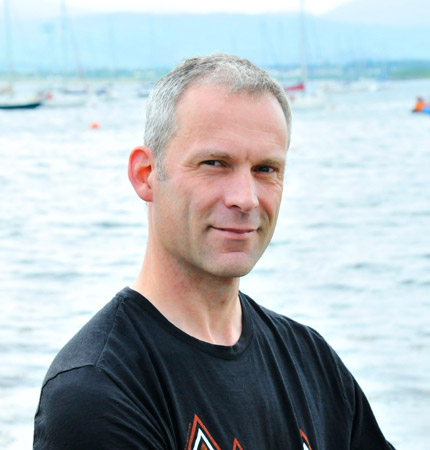Flow processes at a vast range of scales profoundly shape the marine environment. I am interested in understanding the ocean at the level of its fluid dynamical processes, but also study how this fluid backdrop influences marine ecosystems and mediates our impacts on the ocean. Aspects of ocean dynamics that I am particularly interested in include:
- >Tidal straits and their outflow plumes
- >Mechanisms of horizontal transport and dispersion
- >Internal waves and tides
- >Coastal upwelling processes
- >Deep sea flow processes and mixing
Examples of applications to other aspects of the marine environment include:
- >Use of energetic tidal flows by cetaceans and seabirds
- >Dispersion of sediment plumes in coastal waters and the deep sea
- >Physical influences on deep-sea ecosystems
- >Transport of animal carcases
Current research projects
iAtlantic (Integrated Assessment of Atlantic Marine Ecosystems in Space and Time). Funded by EU Horizon 2020. 2019-23
COMPASS (Collaborative Oceangraphy & Monitoring for Protected Areas and Species): creating a network of buoys to track, model and monitor aquatic life and oceanographic processes between Scotland, Northern Ireland and the Republic of Ireland. The project develops common, connected monitoring programmes and data management practices across the regions. Project led by Agri-Food & Biosciences Institute, with other partners being Marine Institute, Inland Fisheries Ireland, Marine Scotland Science and SAMS. Funded with €6.28M by EU Interreg VA through the Special EU Programmes Body. 2017-21
AlterECO: An alternative framework to assess marine ecosystem functioning in shelf seas. Funded by NERC, DEFRA and WWF. 2017-20
AGRI-SATT: enhancing natural micro-algae growth at the world-largest AI-automated zero-emission protein production site. Funded by INNOVATE UK. 2020-23
Past highlight projects
Windy HABs: minimizing the risk of harm to aquaculture and human health from advective harmful algal blooms through early warning (Windy HABS): Funded by BBSRC and NERC. 2015-17
FASTNEt: Fuxes across sloping topography of the North East Atlantic: Funded by NERC. 2013-15
Lecturing
Marine Science BSc: Module leader year 1 'Introdution to Physical Oceanography'
Marine Science with Oceanography and Robotics BSc: Module leader year 2 'Advanced Mathematics and Programming'
Marine Science BSc: Lecturer year 4 'Deep Sea Ecosystems'
Marine Science BSc: Lecturer year 4 'Marine Modelling'
IDCORE lecturer
Alumni research students
Sarah Hughes: Inflow of Atlantic water to the North Sea: seasonal variability on the East Shetland Shelf. PhD 2007-13. UHI
Mike Bedington: Drift modelling of marine mammal carcases in coastal waters. PhD 2012-16. UHI
Employment history
2006-present Principal Investigator in Numerical Modelling. SAMS
1997-2005 Research Associate. Oregon State University, USA
1990-96 Graduate Research Assistant. Unit for Coastal and Estuarine Studies. School of Ocean Sciences. University of Wales, Bangor
Qualifications
1996 PhD Oceanography. University of Wales
1990 BSc Mathematics. University of Durham
